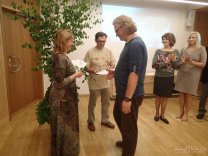Lithuanian traditions
Lina Birmante
2023-11-03
The first humans arrived on the territory of modern Lithuania in the second half of the 10th millennium BC after the glaciers receded at the end of the last glacial period.According to the historian Marija Gimbutas, these people came from two directions: the Jutland Peninsula and from present-day Poland. They brought two different cultures, as evidenced by the tools they used.

They were traveling hunters and did not form stable settlements. In the 8th millennium BC, the climate became much warmer, and forests developed. The inhabitants of what is now Lithuania then traveled less and engaged in local hunting, gathering and fresh-water fishing. During the 6th–5th millennium BC, various animals were domesticated and dwellings became more sophisticated in order to shelter larger families. Agriculture did not emerge until the 3rd millennium BC due to a harsh climate and terrain and a lack of suitable tools to cultivate the land. Crafts and trade also started to form at this time.
Ask a question
Please login to ask question






